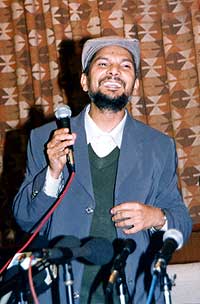 As the monarch and the Maoists articulated their aspirations for our common future last week, it was easy to miss the maturity the political mainstream parties have begun to acquire. UML general secretary Madhav Kumar Nepal's assertion that there was no need for political parties to participate in a peace process triggered by the government and rebels' guns conformed to the standard line. The difference was that he wasn't moaning about the marginalisation of the big parties. Otherwise, he wouldn't have counselled both camps to show enough flexibility to prevent the rebels from returning to the jungles.
As the monarch and the Maoists articulated their aspirations for our common future last week, it was easy to miss the maturity the political mainstream parties have begun to acquire. UML general secretary Madhav Kumar Nepal's assertion that there was no need for political parties to participate in a peace process triggered by the government and rebels' guns conformed to the standard line. The difference was that he wasn't moaning about the marginalisation of the big parties. Otherwise, he wouldn't have counselled both camps to show enough flexibility to prevent the rebels from returning to the jungles. Napoleonic prudence would have persuaded Nepal not to interrupt his rivals while he thought they were making a big mistake. It's very difficult not to offer advice when it comes to your own area of expertise. As a member of the panel that drafted today's constitution, Nepal is eminently qualified to suggest that the peace talks should focus on the issues of women, the tribals, oppressed and regional problems as well as the wishes and aspirations of the people. Having sensed that Prime Minister Lokendra Bahadur Chand and Maoist No 2 Baburam Bhattarai were about to share the Reporters Club podium, Nepal left the hall. In retrospect, he did so in a constructive spirit, not because of political claustrophobia.
Which brings us to the larger point. For the last six months, the mainstream parties have been on a frantic search for space, little recognising the room they have occupied for good. It's easy to rail against the Nepali Congress and the UML for failing to agree on how the king should correct his 4 October foray into active politics. Politicians are supposed to think ahead of us, and that's what they're doing. Nepal knows what lurks behind Girija Prasad Koirala's offering to the UML to lead the government in a reinstated House of Representatives. The Nepali Congress parliamentary party has not officially split. All it would take for the kangresis to form a majority government is the expulsion of Sher Bahadur Deuba. As a bonus, the chief whip would have one less MP to watch out for ahead of the next no-confidence motion.
As for Nepal's demand for an all-party government, the kangresis remember how the comrades reaped all the benefits of incumbency under the Krishna Prasad Bhattarai and Koirala governments while evading responsibility for their failures. How many of us remember that Sahana Pradhan was on Bhattarai's delegation to New Delhi that immortalised the term "common rivers"? If politics isn't philanthropy, it's not entirely our leaders' fault.
The centrality of the political mainstream is illuminated by the bright side of the last six months.
Koirala has proved that it is possible to insulate your core convictions from the venality of politics. The UML has never stood so solidly behind this constitution. Who thought the Rastriya Prajatantra Party would still have people worrying about their democratic credentials? The rival faction blames Deputy Prime Minister Badri Prasad Mandal for splitting the Nepal Sadbhavana Party. At a time when we want goodwill to pervade the entire country, maybe the party is onto something marvellous. Don't be surprised if Bijay Kumar Gachchadar decides to contest the next election from Sankhuwasabha.
Narayan Man Bijukchhe, who has emerged as the most moderate radical, is spoken of as a possible prime minister. How equal could political opportunity be? Amik Serchan refused to meet the king because he had nothing to add since their last talks and could say so.
Nepalis should never be forced to choose between peace and liberty. When mainstream politicians raised that point directly, we questioned their sense of responsibility to the nation. So the UML chief rephrased the debate. The Maoists, who in their earlier incarnation controlled seven seats in parliament, wreaked such devastation. Don't even contemplate what the Nepali Congress and UML, which had 185 seats between them, could do.
Making fun of the mainstream leaders would be fine as long as the upper house is around and the press retains its freedom. Should we start suffocating again, we can always look up to the kangresis and comrades. This thought would have been comforting but for the consequence of this commendation-condemnation cycle. Fifty-two years after the dawn of democracy, we're still struggling to cast enough light on the pros and cons of a constituent assembly.


